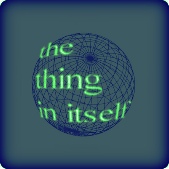



 NEXT
NEXT
 BACK
BACK
 Forum
Forum


Philosophical musings on Quanta & Qualia; Materialism & Spiritualism; Science & Religion; Pragmatism & Idealism, etc.




A philosophical worldview or belief system grounded on the 20th century discovery that Information, rather than Matter, is the fundamental substance of everything in the universe. It is intended to be the 21st century successor to the ancient worldviews of Materialism and Idealism. An Update from Bronze Age to Information Age. It's also a Theory – of – Everything that covers, not just matter & energy, but also Life & Mind & Love.
11. Phenomena vs Noumena :
“According to Kant, it is vital always to distinguish between the distinct realms of phenomena and noumena. Phenomena are the appear-
12. Imperfect Perception :
“Evolution by natural selection has not endowed human beings with perceptual systems (sensory apparatus) that give us an accurate picture of fundamental reality. This is because seeing reality as it is would provide no fit-
Post 131. August 28, 2023
Creative Mind and Cosmic Order
Phenomena vs Noumena
In his chapter on Realism, Pinter describes that sense-
Pinter’s book also has a chapter discussing the Mind vs Matter debate in modern philosophy. Regarding the materialistic bias of modern Science and Philosophy, He says “the most widely shared opinion today is that mental phenomena are subject to physical law, and can be fully explained by the principles of physics”. Ironically, that presumption is more of a hopeful belief than a settled science. Neuroscience remains an immature discipline in search of evidence for its own core belief : the physical or “neural basis” of Consciousness (i.e mind & self) . However, few philosophers today would argue that mental and intellectual phenomena (appearances) exist super-
He refers to that alternative science as Functionalism. “The essence of functionalism is that all that matters is the way the tasks interact globally as a system”. An ancient name for that non-
Blog Pos t 131
t 131 continued . . . . click Next
continued . . . . click Next 


13. Holism :
“The theory that parts of a whole are in intimate interconnection, such that they cannot exist independently of the whole, or cannot be understood without reference to the whole, which is thus regarded as greater than the sum of its parts. Holism is often applied to mental states, language, and ecology.”
Oxford Dictionary
14. Systems Theory :
“By taking a holistic view, systems theory attempts to explain how different parts of the system are inter-
https://www.structural-
15. EnFormAction :
The creative power of Nature to enform; to cause transformations from one form to another.
https://bothandblog2.enformationism.info/page29.html
Appearances
can be
Deceiving


Mind & the
Cosmic Order
How the Mind Creates the Features & Structure of
All Things
Charles Pinter
Mathematician & Philosopher
Due to biological imperatives, we are made to imagine that objects “really are exactly as we experience seeing them.